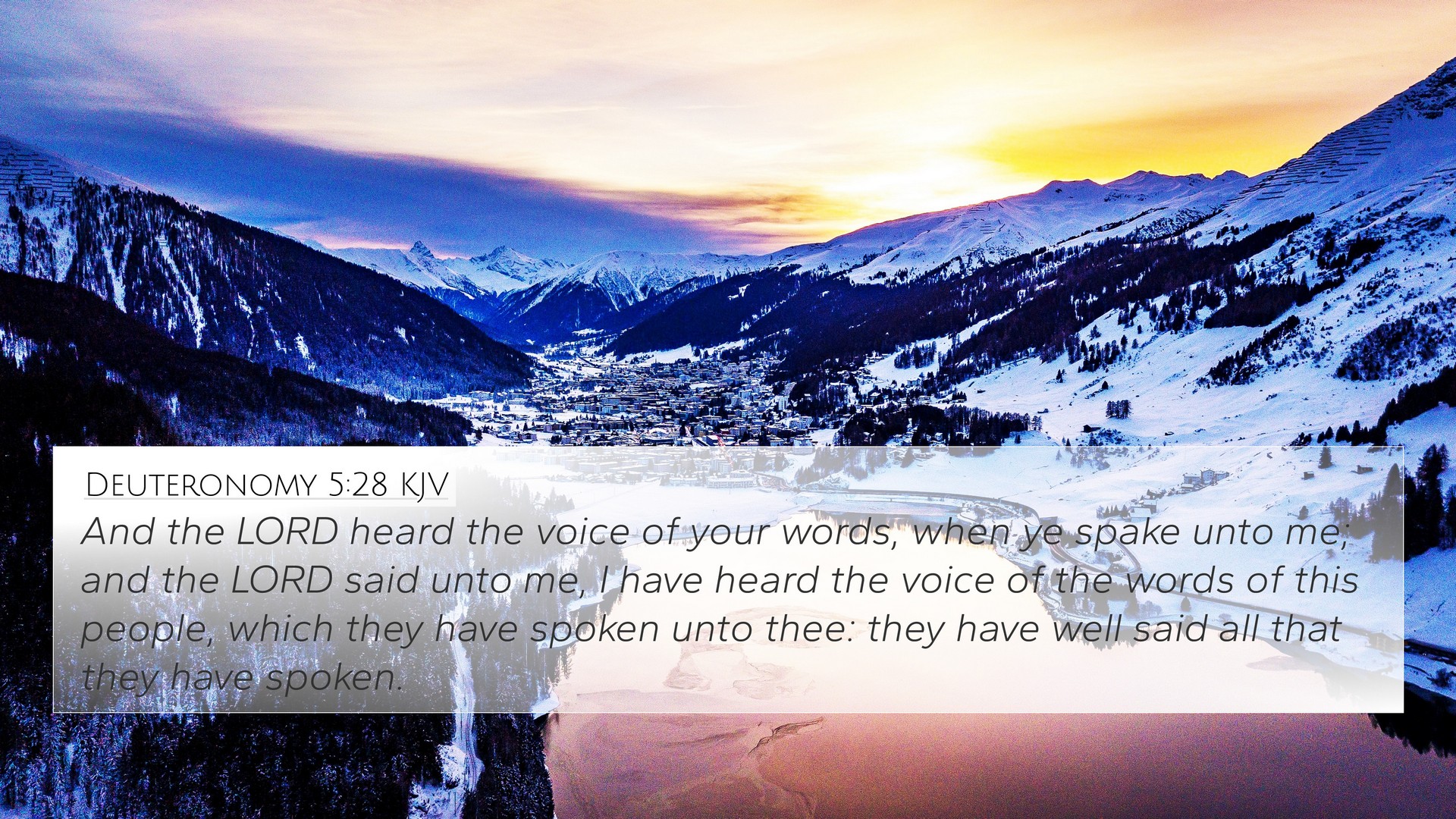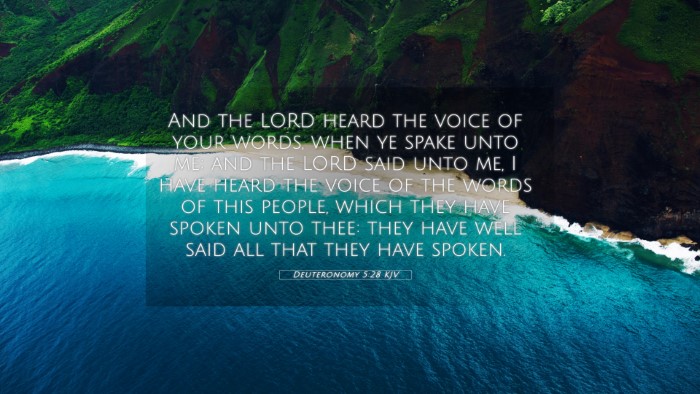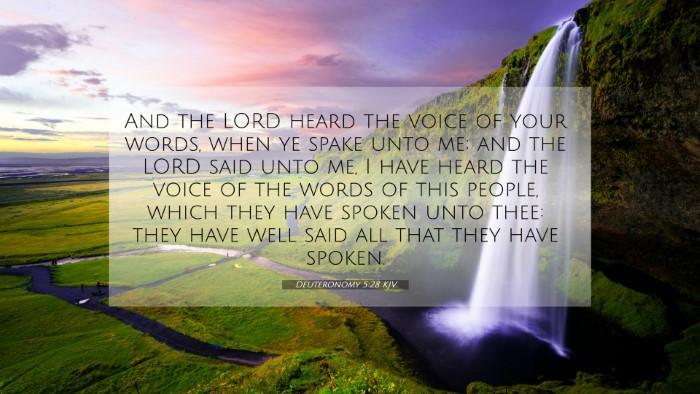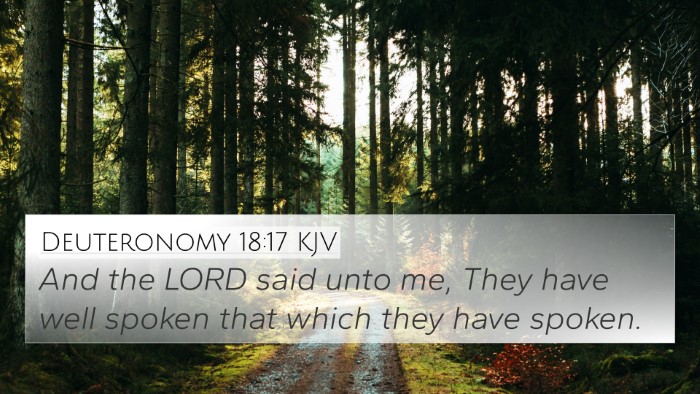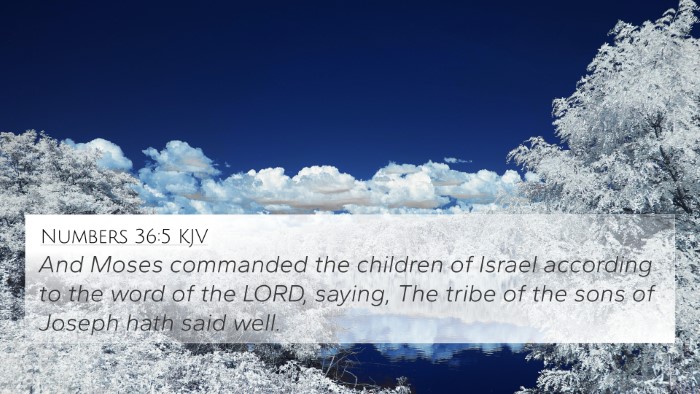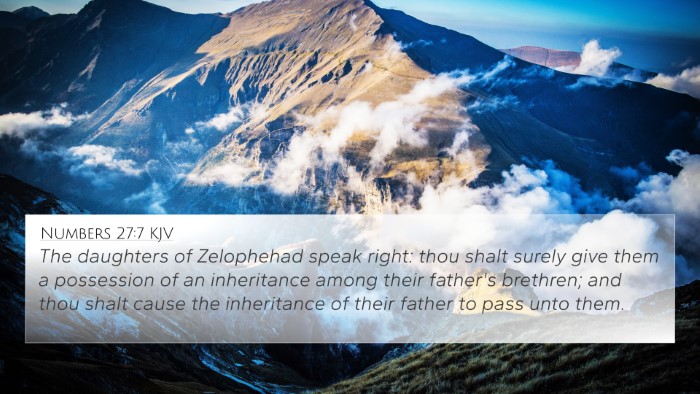Understanding Deuteronomy 5:28
Deuteronomy 5:28 states:
"And the Lord heard the voice of your words, when ye spake unto me; and the Lord said unto me, I have heard the voice of the words of this people, which they have spoken unto thee: they have well said all that they have spoken."
This verse captures a significant moment in Israel’s history where God acknowledges the concerns expressed by the people of Israel to Moses. The context of this verse is pivotal as it reflects the relationship and communication between God, His people, and their leader Moses.
Summary of Insights
-
Matthew Henry's Commentary:
Matthew Henry highlights that this verse emphasizes God's attentiveness to His people's needs and a willingness to listen. The collective voice of the people was not dismissed; rather, it was received positively by God, affirming their request for a mediator—a significant moment that foreshadows the prophetic mediatorship of Moses.
-
Albert Barnes' Notes:
Barnes elaborates on God's response to the people's plea for a mediator and interprets it as God's grace in acknowledging their fears. He notes that the people rightly recognized their inability to approach God directly after encountering His holiness, thus establishing the necessity of mediators in their relationship with God.
-
Adam Clarke's Commentary:
Clarke draws attention to the importance of the people's recognition of their limitations when faced with God's greatness. This acknowledgment is seen not only as a fear of God's presence but as an essential aspect of true worship—a reverential understanding of their stance before God.
Cross-References
Deuteronomy 5:28 can be cross-referenced with several other Bible passages that deepen the understanding of this verse's themes and principles:
- Exodus 20:19: The people's fear of direct encounter with God highlights their request for Moses as a mediator.
- Numbers 12:7: This verse illustrates Moses as a faithful servant and mediator, listening to God's voice.
- 1 Timothy 2:5: This New Testament passage emphasizes the concept of mediation through Christ, connecting with Moses’ role.
- Hebrews 8:6: Christ is described as a mediator of a better covenant, linking to Moses' mediation.
- Hebrews 12:18-22: The contrasting experiences of approaching God—one of fear and one of joy—shed light on God's nature and our response.
- Romans 10:17: The necessity of hearing God's word connects to how the people responded to God's laws.
- Isaiah 53:4-5: The idea of bearing fear and sin connects to the role of intercession in mediation.
- Jeremiah 31:34: God's promise for a new covenant where He will directly teach His people relates to the previous mediatorial structure.
- John 10:27-28: The shepherd's voice and the relationship between God and His people can be seen as a fulfillment of the direct knowledge promised.
- Galatians 3:19: Reflects on the law’s purpose and mediation through angels, emphasizing God's ongoing communication.
Thematic Connections
The themes present in Deuteronomy 5:28 can be related to various broader Biblical concepts:
- Covenant Relationship: The dynamics of God's covenant with His people are evident in the interaction described, revealing God's limitations in response to human inability.
- Mediation: The necessity of a mediator, starting from Moses to Jesus, signifies the continuous need for intercession in the human-divine relationship.
- God’s Listening Nature: Throughout scripture, God is portrayed as a listener, which is pivotal for prayer, worship, and confession.
- Reverence vs. Intimacy: Both the fear of God and the call to intimacy are evident; balancing both aspects is crucial in worship.
- God’s Holiness: Recognizing the holiness of God demands a reflective approach to interactions, informing prayers and requests.
Conclusion
Deuteronomy 5:28 serves as an anchor for understanding the role of mediation in the Old Testament while also foreshadowing the ultimate mediation through Christ in the New Testament. The combined insights from several esteemed commentaries strengthen the interpretation of God’s attentiveness, the acknowledgment of fear, and the establishment of a covenant relationship that persists throughout Scripture. These themes echo through many other passages, illustrating the interconnectedness of the Bible.
SEO Keywords Usage
In analyzing Deuteronomy 5:28, several bible verse cross-references and connections between Bible verses have been discussed. The linking Bible scriptures from both the Old and New Testaments show how themes like mediation, God’s listening nature, and the covenant relationship resonate throughout the biblical narrative. Tools for Bible cross-referencing allow believers to explore these connections deeper, enriching their understanding of scripture.
